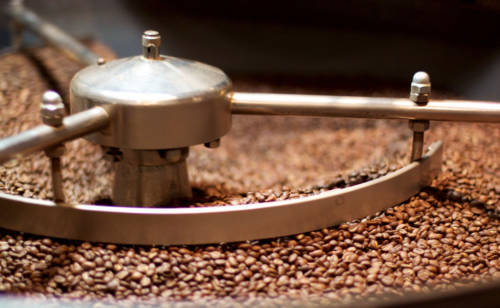THRIVE Initiates Platform for Farmer-Direct Specialty Coffee
In an era when “bean-to-bar” chocolate and fair trade coffee are household commodities for many Americans and Europeans, the concept of sustainably-sourced, farmer-direct coffee was destined to be well-received. THRIVE‘s farmer-direct specialty coffee aims to “change the way coffee gets from farm to cup” by giving farmers direct access to the marketplace and allowing them to maintain ownership over their commodity until the point of sale.
In order to create a sustainable supply model, coffee farmers harvest their crops according to THRIVE’s growing standards (which includes qualifications for USDA Organic certification). The majority of specialty coffee that THRIVE sources is produced by what are known as “smallholder coffee farmers”– people who farm on less than five acres of land, like Franklin Garbanzo of La Violeta Costa Rica, who is a pioneer in developing and sharing sustainable farming practices with his local community of farmers.
“Consumers can purchase hand-crafted specialty coffees from the premier growing regions of the world, at prices typically reserved for mass-produced coffee. The retailers, meanwhile, have the assurance of knowing exactly where their product comes from– as well as who produced it.”
Under the THRIVE model, farmers like Garbanzo process their red coffee cherries in wet and dry mills that are operated by THRIVE farmers’ strategic partners. After exporting, the green coffee beans are bagged and exported to the US to be roasted and distributed to consumers through direct online channels, coffee houses, roasters, and retail grocers.
Consumers can purchase hand-crafted specialty coffees from some of the premier growing regions of the world, at prices typically reserved for mass-produced coffee. The retailers, meanwhile, are given the assurance of knowing exactly where their product comes from– as well as who produced it.
“Currently, the world’s coffee growers receive only a small percentage of profits as the global coffee supply moves through a complicated system of production.”
Currently, the world’s coffee growers receive only a small percentage of profits as the global coffee supply moves through a complicated system of production. Most farmers lose ownership over the crop from the moment it is handed over to processing firms, and with this loss of ownership crop growers lose out on the steep value-added profit margin that comes with the processing, roasting, and distribution of coffee worldwide.
In addition to its smallholder farmers, THRIVE often partners with estate farms, farmer co-ops, and other micro-mill farmers, who can round out the quantity required to supply a mass coffee market, which ultimately allows more smallholder farmers to enter into the partnership.
Farmers receive a fixed percentage of their coffee’s revenue under THRIVE; the higher the quality of coffee, the more valuable it is in the marketplace, which equates to more income for the farmers and an incentive to continually improve the quality and sustainability of their crop. (This, in turn, gives consumers access to increasingly better “farm-to-cup” coffee.) THRIVE, meanwhile, partners with companies who want to enter into long-term partnerships with farmers to create economic sustainability. By allowing them to participate economically at the end of the supply chain, farmers can capture added value from their crops and invest it in their families and in the future of their communities.
Accordingly, environmental, economic, and social sustainability plays a key role in this process: THRIVE works with it’s farmers to ensure that its farm families are given access to the business tools, distribution channels, resources, and knowledge necessary to improve their crops and make a livable income.
“By responding to farmers’ interests and requests, THRIVE ensures that they invest in people in the same manner that their producers invest in their land.”
This might mean incentivizing farmers to invest in local services and hired labor (which benefits the surrounding community) or teaching producers basic agronomic skills like replacing old coffee plants, planting shade trees, and teaching them how to protect and invest in the future of their soil. Best of all, by responding to farmers’ interests and requests, THRIVE ensures that they invest in people in the same manner that their producers invest in their land. It’s a maverick concept that would at first seem obvious: invest in people so that they can make a better product, and improve quality of life for all.
THRIVE Coffee is available for purchase on the company’s website.
Below, watch THRIVE farmers in Guatemala and Costa Rica stenciling burlap and worm-composting their soil, and listen to the Morales family in Finca El Carmen tell the story of their coffee farm.



































